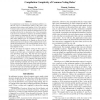1047 search results - page 66 / 210 » Learning the required number of agents for complex tasks |
WSC
2004
13 years 9 months ago
2004
This work provides a generalization of the traditional response surface methodology (RSM) that can be applied to complex, multi-objective simulation studies. These problems involv...
ICRA
2010
IEEE
13 years 6 months ago
2010
IEEE
— Reinforcement learning (RL) algorithms have long been promising methods for enabling an autonomous robot to improve its behavior on sequential decision-making tasks. The obviou...
AAAI
2007
13 years 10 months ago
2007
A traditional goal of Artificial Intelligence research has been a system that can read unrestricted natural language texts on a given topic, build a model of that topic and reason...
IAT
2008
IEEE
14 years 2 months ago
2008
IEEE
Multi-agent systems have proven to be a powerful technology for building complex distributed applications. However, the process of designing, configuring and deploying agent-based...
AAAI
2010
13 years 9 months ago
2010
In computational social choice, one important problem is to take the votes of a subelectorate (subset of the voters), and summarize them using a small number of bits. This needs t...

